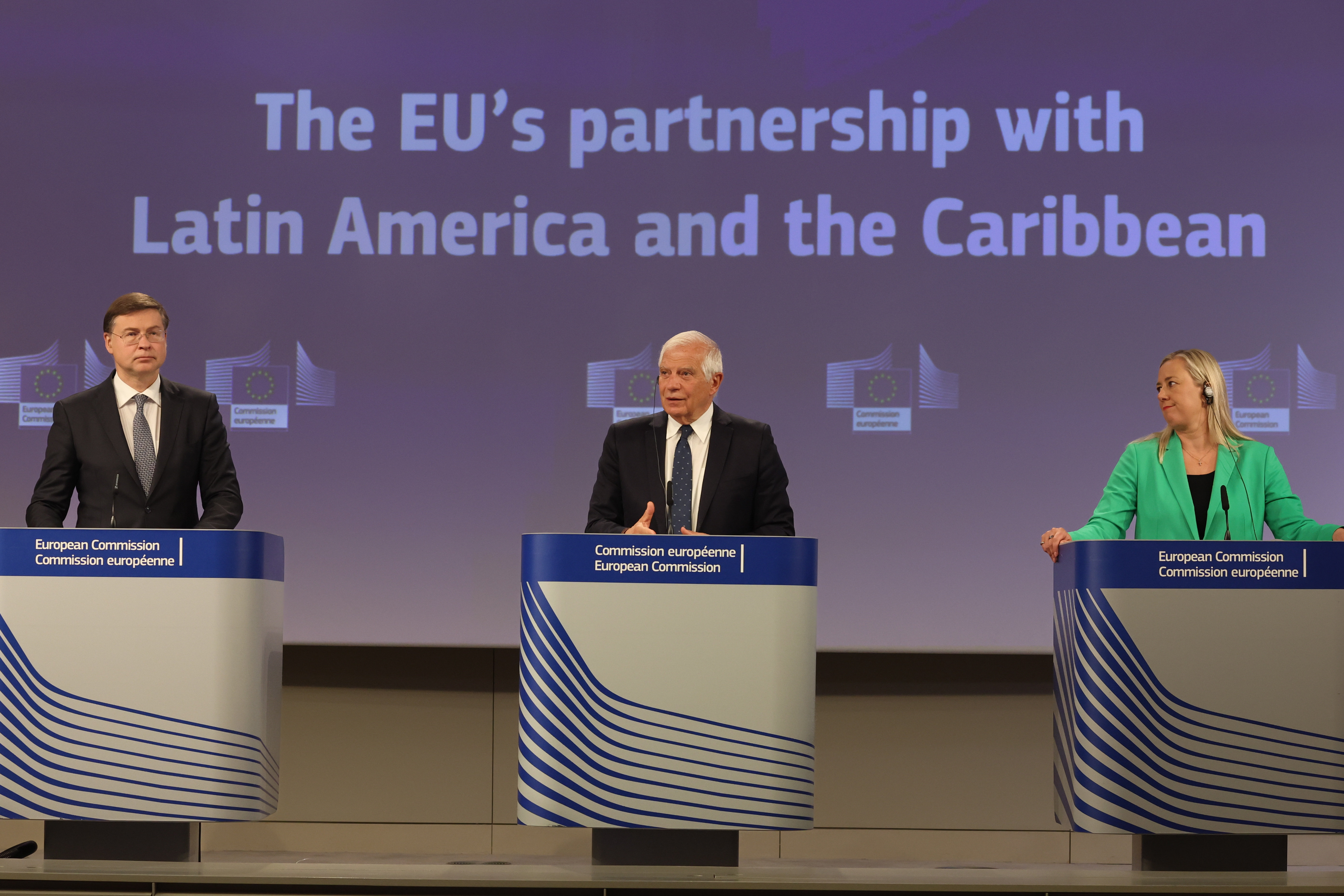Wirtschaft
The Future of Nearshoring and Trade Between the European Union and Mexico

Der für eine funktionierende Wirtschaft zuständige Vizepräsident der Europäischen Kommission und EU-Kommissar für Handel, Valdis Dombrovskis, der Hohe Vertreter der Europäischen Union für Außen- und Sicherheitspolitik, Josep Borrell, und die EU-Kommissarin für internationale Partnerschaften, Jutta Urpilainen, sprechen auf einer Pressekonferenz zur Vorstellung einer neuen Agenda für die Partnerschaft der EU mit Lateinamerika und der Karibik
© picture alliance / EPA | OLIVIER HOSLETThe strategic value of Latin America and the Caribbean has increased for the European Union (EU) since the Russian invasion of Ukraine in February 2022. Politically, Latin American governments are important when it comes to voting on resolutions on Russia at the United Nations General Assembly. Economically, Latin America, just like Russia, also has raw materials such as natural gas and oil, among others, that supply the EU. Strategically, the EU already imports raw materials from Latin America, which are key to the green transformation of European economies.
In 2022, Spanish Foreign Minister José Manuel Albares stated that Latin America is the region that fits best with Europe. The EU-Mercosur Association Agreement and the modernization of the trade agreements with Chile and Mexico should be a high economic and political priority, as they would represent a "strategic deepening of the EU" in relation to Latin America.
However, from the EU's perspective, Latin America is not a key trading partner. Brazil and Mexico rank 11th and 13th, respectively, representing 1.6% and 1.4% of EU foreign trade in 2021. In many Latin American countries, the EU has been overtaken by China, becoming the region’s first trading partner in goods. However, the EU is still the leader in investment in the region; Brazil (3%) and Mexico (2%) absorbed the largest amount of EU Foreign Direct Investment (FDI).
As for Mexico, the country has focused on –and benefited from– the U.S.-Mexico-Canada Trade Agreement (USMCA) and the shift of manufacturing supply chains from Asia to the Americas, commonly known as nearshoring. While 50% of the investment withdrawn from China has shifted to Vietnam, Mexico accounts for only 5% of this investment. Although the country is not at the forefront of nearshoring, geopolitical considerations could open a new opportunity to improve trade relations between Mexico and the EU.
Nearshoring, Friendshoring, and Challenges for Mexico
Although the country is not at the forefront of nearshoring, geopolitical considerations could open a new opportunity to improve trade relations between Mexico and the EU. In recent years, not only geographic factors, but especially geopolitical factors have been influencing the location choices of companies and countries. This is leading to an increase in so-called friendshoring, i.e. the conversion of supply chains of Western industrialized countries that source a larger share of their inputs from politically friendly economies. The bottom line is that political differences are becoming a relevant factor in determining the extent to which countries trade with each other. Companies are not selecting their factory locations from a list of allied nations but are increasingly including geopolitics in their risk calculations.
For this to happen, the U.S. government and the EU must restore the continuity of production chains that have been interrupted by the pandemic, the changing environment in China and the war in Ukraine, so that there is an opportunity for Mexico to attract investment and improve trade relations. As Michael Link MdB, Coordinator for Transatlantic Cooperation, suggested, Mexico should be considered as a country that geographically belongs to North America and culturally to Latin America; it has a relevant and unique role on the international stage and therefore in transatlantic relations.

Michael Link MdB, Koordinator für die transatlantische Zusammenarbeit
© FNFMexico's proximity to the U.S., the industrial infrastructure the country has developed in recent years, the USMCA, and the other 12 international treaties signed by Mexico make it a natural destination for trade and investment. In addition to nearshoring, the term friendshoring has been coined for relocation to countries with fewer geopolitical risks. Mexico's economic growth is based on the export of goods, services, and the integration into value chains. Therefore, it is important to improve relations with the European Union and diversify trade and investment beyond the United States. Unlike other treaties Mexico has signed with other countries, improving trade relations with the EU would mean a shared commitment to work together on issues such as climate change, human rights, poverty, and anti-corruption –issues that are of critical importance to the country–.
According to the EU Delegation in Mexico, the country faces important challenges to position itself. The availability of clean energy sources that meet the needs of European companies is at the top of the list. Before the current administration, Mexico had moved toward more sustainable energy reform and paved the way for the clean energy market. However, the current legislation does not promote clean energy at the federal level, a step back in moving towards a greener transition. Another key challenge is the availability of skilled labor, as companies demand more skilled workers than are available. Dual programs, such as those run by German companies in Mexico in collaboration with educational institutions, and Erasmus Mundus scholarships have shown a way forward here.
Infrastructure security and institutional frameworks remain a challenge that has not been addressed by the Mexican federal government. To attract more investment, some state and municipal governors are taking the lead on their own by promoting government developments in institutional and infrastructure frameworks during international trips to Asia and Europe, such as the Hannover Messe trade fair.
Despite the challenges and other factors, such as ongoing impunity and violence throughout the country, the location of companies in Mexico remains steady: Germany's ZG Group invested more than $194 million in its Ciudad Juárez plant on the border with El Paso, Texas, to expand its electric mobility business in the United States. The same company is manufacturing components for hybrid and electric vehicles in Coahuila and training students and employees to become the electromobility workforce of the future. Denmark's Lego has expanded its Nuevo León plant to become the company's largest factory in the world with an investment of $507 million and with 90% of its suppliers being small and medium-sized local companies that benefit from the expansion. American toy giant, Mattel, followed last April.
Urgent Steps for EU-Mexico Trade and Investment Relations
The shoring trend will continue as companies diversify their supply chains away from China. At the federal level, Mexico does not have an investment or trade promotion strategy. However, at the local level, several states are already building alliances between the private and public sectors to attract more investment. Of Mexico's 32 states, six are moving forward. This situation offers the country the opportunity to advance decentralization and thus benefit the country.
This could be a great opportunity for the EU, as Spanish, French, and German companies have expanded in Mexico. European investment has been concentrated in the automotive, aerospace, beverage, and pharmaceutical sectors - in total there are 19,080 companies with capital from the EU. Experts in Mexico and the EU agree that ratification of the trade agreement is important to boost processes, promote small and medium-sized businesses in Mexico, and allow EU companies to comply with environmental regulations. High Mexican tariffs in certain sectors make European products more expensive in Mexico and therefore less attractive to Mexican consumers. The new trade agreement makes European products more competitive in Mexico and makes it easier for European manufacturers and exporters to sell their goods in Mexico.
The conclusion of a new, modernized agreement would send a clear signal to the world that both Mexico and the EU reject protectionism. In addition, Mexico would align its standards with those of the EU, making it easier for EU companies to export to Mexico and strengthening international standards in the areas of the environment and sustainability. Companies in the business and financial services, telecommunications, and transport sectors are expected to benefit. In addition, the trade agreement is part of the broader new EU-Mexico Global Agreement, which will strengthen cooperation and regular high-level meetings between Mexico and the EU in the areas of human rights, security, and justice.
